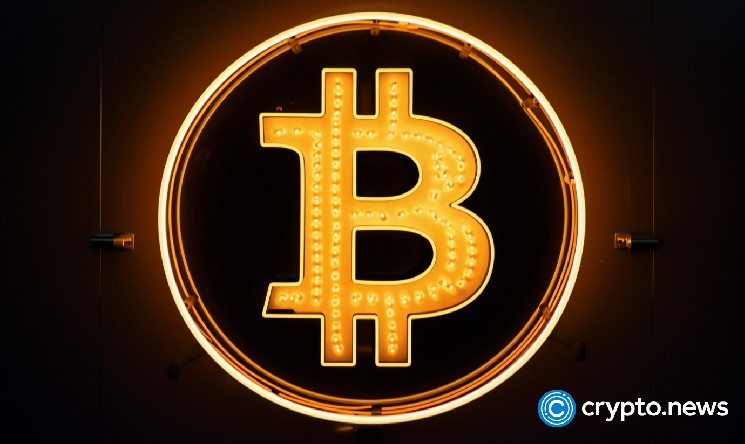F2Pool mining pool produced an invalid bitcoin block, BitMEX Research reveals

BitMEX, a crypto derivatives exchange, pointed out that F2Pool, a bitcoin mining pool, produced an invalid block at height 783426 on April 1, 2023. However, they did not state why and are still investigating the matter.
F2pool seems to have produced an invalid Bitcoin block today, at height 783426.
The hash for the invalid block is
00000000000000000002ec935e245f8ae70fc68cc828f05bf4cfa002668599e4
— BitMEX Research (@BitMEXResearch) April 1, 2023
F2pool produced an invalid bitcoin block
According to BitMEX sponsored node monitoring tool, ForkMonitor, the bitcoin height 783426 produced two blocks. The hash for the invalid block is 00000000000000000002ec935e245f8ae70fc68cc828f05bf4cfa002668599e4.
According to the node monitoring tool ForkMonitor, the Bitcoin network block height 783426 produced two blocks. BitMex Research stated that it is suspected that F2pool produced an invalid block, and the specific reason is still under study. https://t.co/zbUsp4CSTZ
— Wu Blockchain (@WuBlockchain) April 1, 2023
A bitcoin block is considered valid if it adheres to the protocol rules. BitMEX suspects that the invalid block resulted from bad signature operations. The exchange stated it is still looking into it as they try to explain the anomaly.
BitMEX launched ForkMonitor in 2018 to keep track of hard and soft forks on the Bitcoin blockchain. ForkMonitor is connected to 13 nodes of Bitcoin and its hard forks, including Bitcoin Cash. The tool is also used to detect unintentional consensus bugs.
You might also like: BitMEX Launches Fork Monitoring Website Targeted at Bitcoin Cash Hard Fork
Invalid bitcoin blocks
Events that could invalidate a mined bitcoin block include double spending, where the same funds are spent twice. The network will confirm one transaction and reject the other as invalid.
Nodes are not going to accept an invalid transaction as payment, and honest nodes will never accept a block containing them. An attacker can only try to change one of his own transactions to take back money he recently spent.
— Bitcoin Whitepaper Bot ? (@BitcoinWPBot) April 1, 2023
Another reason could be when a miner tries to spend bitcoin that they do not own. The network will reject the transaction since the user lacks the necessary funds in their wallet.
A transaction that did not pass script validation and whose time-locked transaction does not meet the lock time is also considered invalid. Bitcoin blocks are released roughly every 10 minutes as set out at the protocol level.
Some miners choose to start mining without validating to get a head start. Still, the risk remains larger than the rewards expected.







 Bitcoin
Bitcoin  Ethereum
Ethereum  Tether
Tether  USDC
USDC  Dogecoin
Dogecoin  Cardano
Cardano  TRON
TRON  Bitcoin Cash
Bitcoin Cash  Chainlink
Chainlink  Polygon
Polygon  Litecoin
Litecoin  LEO Token
LEO Token  Dai
Dai  Ethereum Classic
Ethereum Classic  Hedera
Hedera  Cronos
Cronos  Cosmos Hub
Cosmos Hub  Stacks
Stacks  Stellar
Stellar  OKB
OKB  Maker
Maker  Monero
Monero  Theta Network
Theta Network  Algorand
Algorand  NEO
NEO  Gate
Gate  KuCoin
KuCoin  EOS
EOS  Tezos
Tezos  Synthetix Network
Synthetix Network  IOTA
IOTA  Bitcoin Gold
Bitcoin Gold  Tether Gold
Tether Gold  TrueUSD
TrueUSD  Enjin Coin
Enjin Coin  Zilliqa
Zilliqa  0x Protocol
0x Protocol  Ravencoin
Ravencoin  Holo
Holo  Siacoin
Siacoin  Qtum
Qtum  Basic Attention
Basic Attention  Zcash
Zcash  Dash
Dash  NEM
NEM  Decred
Decred  Ontology
Ontology  Lisk
Lisk  Waves
Waves  DigiByte
DigiByte  Numeraire
Numeraire  Nano
Nano  Pax Dollar
Pax Dollar  Status
Status  Hive
Hive  Steem
Steem  OMG Network
OMG Network  Huobi
Huobi  BUSD
BUSD  Ren
Ren  Bytom
Bytom  Bitcoin Diamond
Bitcoin Diamond  Kyber Network Crystal Legacy
Kyber Network Crystal Legacy  Augur
Augur  HUSD
HUSD  Energi
Energi